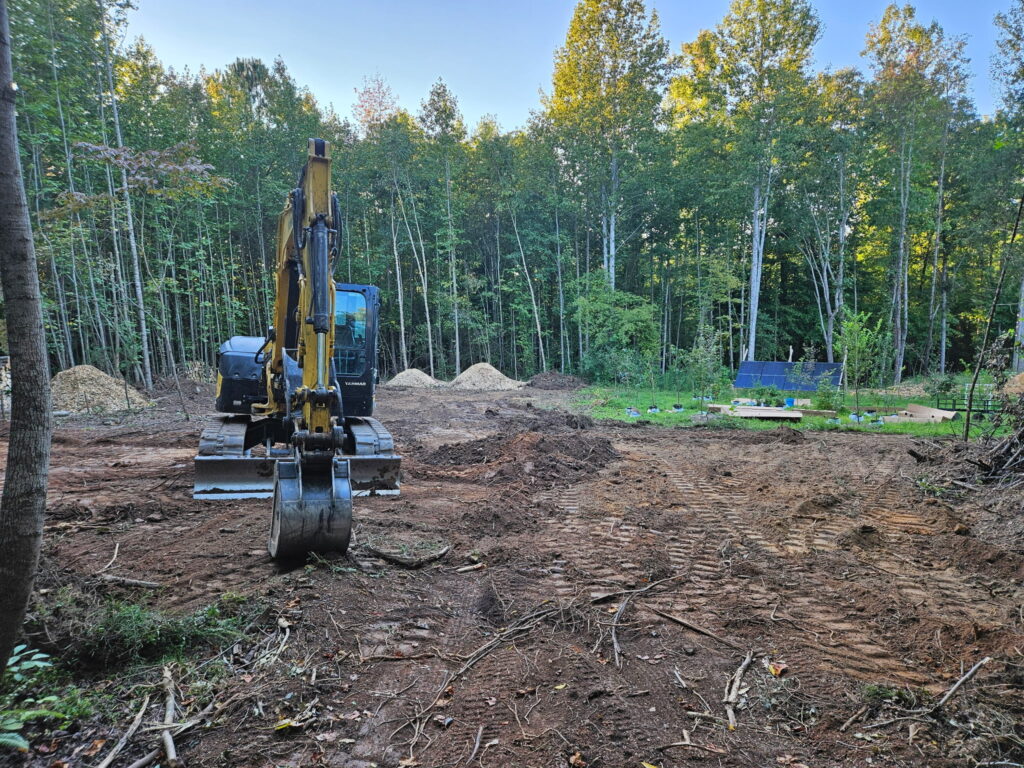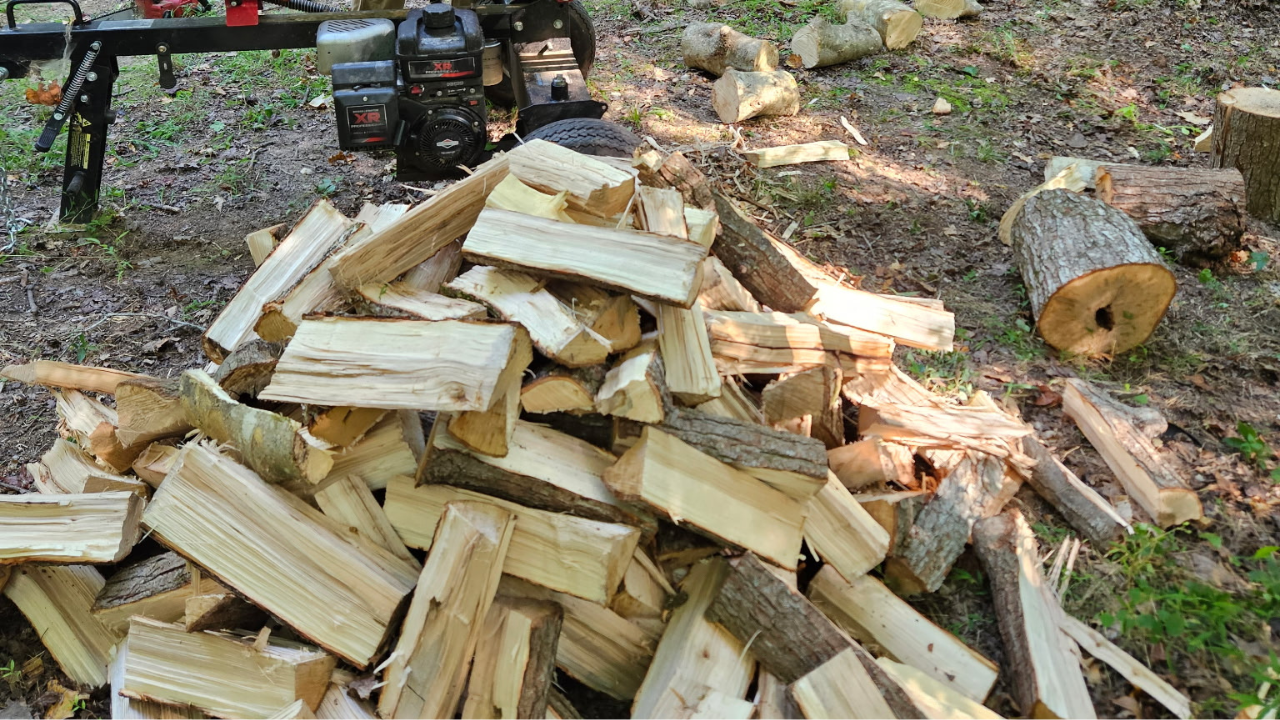When a tree comes down, the pile of wood chips left behind can feel like a problem, but it’s actually an opportunity.
Instead of having Timber Brute dispose of them (which we are happy to do for you), you can repurpose those chips for gardening, landscaping, or even eco-friendly projects around your yard. Here’s how to put them to good use.
What to do with wood chips after tree removal?
You can repurpose wood chips as mulch, compost, paths, bedding, or donate them, turning waste into a useful resource for your yard.
Key Takeaway
- Wood chips are free, versatile, and eco-friendly.
- Use them as mulch, compost fuel, or erosion control.
- They work for landscaping, pathways, and animal bedding.
- Extra chips can be donated or recycled locally – This is what Timber Brute will do if we haul off the chips for you.
- Avoid piling them too thick or using diseased wood.
Why Not Just Dispose of Wood Chips?

Dumping wood chips might seem like the quick fix, but it’s actually wasting useful material. Instead of paying for disposal, you could repurpose them for mulch, garden paths, or compost, just like you’d repurpose debris smartly in situations such as what to do when a tree falls on your house.
Tossing them also means missing out on a natural way to boost soil health. If you’ve already had tree removal in Ashland, VA, those leftover wood chips can do wonders for your yard. They add texture, style, and that organic touch no store-bought bag can really match.
Common Uses for Wood Chips
- Mulch for Gardens and Paths: Wood chips make a solid mulch option. Spread them around plants, and they lock in moisture while cutting down on weeds. Plus, they give your garden paths that “curated but chill” vibe without spending on overpriced landscaping.
- Natural Weed Blocker: Forget chemical sprays. A thick layer of chips creates a barrier that starves weeds of sunlight. It’s a cheat code for anyone who hates pulling weeds every weekend.
- Erosion Control: Got a slope or patch where soil keeps slipping? Toss chips there. They slow water flow, keep soil in place, and save you from a muddy mess after rain.
- Compost Fuel: Chips break down slower than food scraps, but they’re gold for balancing compost. Mix them in with kitchen waste, and you’ll keep the pile from turning into a slimy disaster. Bonus: earthy, nutrient-packed compost later.
- Walkways and Play Areas: You don’t need a fancy stone to create a path. Spread wood chips, and suddenly you’ve got a low-cost, cushioned walkway. They also work for play zones, softening falls so kids aren’t crying after every trip.
- Animal Bedding: If you’ve got chickens, goats, or even just a dog run, chips work as natural bedding. They soak up smells and moisture better than straw. Swap them out every so often, and you’ll keep the space fresh.
- Decorative Landscaping: Wood chips aren’t just practical, they’re stylish. Use them around trees, flower beds, or patio edges for that clean, put-together look. Think “modern garden Instagram flex” without the boutique price tag.
- Firewood Starter: Not every chip has to stay outdoors. Dried chips are clutch as fire starters. Keep a bucket handy for your fireplace or fire pit, and skip buying chemical firelighters.
- Pathway Drainage: If your yard turns into a swamp when it rains, chips can help. Spread them over wet spots, and they’ll soak up water while making the ground less slippery.
- Hugelkultur & Raised Beds: If you’re into backyard farming, chips are perfect for hugelkultur beds. They decompose slowly, feeding soil over time. That means healthier plants without constant fertiliser runs.
Creative & Alternative Uses
Wood chips don’t have to sit in a pile looking sad. With a little creativity, you can turn them into something useful or even stylish.
Use them as natural pathways in your garden — they’ll keep weeds down, add that rustic park vibe, and save you from muddy shoes. And if you’re wondering is stump removal included in tree removal, it’s good to know that leftover wood can actually be repurposed. Toss smaller pieces into your compost; they break down slowly and help balance out those kitchen scraps.
If you’re feeling crafty, wood chips can fuel small fire pits or smokers, adding that smoky BBQ flavor to your weekend cookout. You can also use them as mulch around trees and shrubs—much like the byproducts you’d get when learning what does tree removal include—locking in moisture like a built-in cheat code for healthier plants.
For a more unexpected move, use the chips in chicken runs or dog areas — they soak up mess, reduce odors, and keep paws clean. Got kids? They even make a softer landing in play zones than bare dirt, similar to how what is tree stump removal helps clear and prep outdoor spaces for safer, cleaner use.
Bottom line, wood chips aren’t wasted. After tree removal in Highland Springs, VA, they’re basically raw material waiting for a remix — perfect for a garden glow-up, backyard grilling, or keeping your space fresh.
Local Recycling & Donation Options
Got more wood chips than your yard can flex? Local recycling centers often scoop them up for mulch or compost. Quick drop-off, problem solved.
Want a cooler play? Check if community gardens, farms, or schools nearby take chip donations. They’ll use them for soil health, paths, or playground cover.
You clear space, they get free resources. That’s a clean win.
Safety Tips & Things to Avoid
Wood chips can be handy, but don’t treat them like free-for-all confetti. Skip piling them too close to your house, or you’ll be inviting termites to crash the party.
Keep layers thin, around 2–3 inches, so your soil still breathes. Don’t use chips from diseased trees in your garden, they’ll spread problems faster than gossip in a group chat.
And if you’re piling those branches near walkways after tree removal in Mechanicsville, VA, keep in mind they can get slick when wet. Translation, you don’t want to turn your path into an accidental slip-and-slide.
Frequently Asked Questions
1. Can I just leave the wood chips in place?
Yeah, you can. They’ll break down over time, feeding the soil. Just don’t pile them too thick or you’ll choke the grass.
2. Are wood chips good for gardens?
Absolutely. They lock in moisture and keep weeds in check. Think of them as a natural mulch with a little backyard drip.
3. What if I’ve got too many?
Spread some on trails, around trees, or hook up a neighbor who wants free mulch. Worst case, Timber Brute can haul them off.
Conclusion
Wood chips don’t need to rot in a pile, they’re a cheat code for your yard. Use them to mulch flower beds, create walkways, or even fire up your compost game.
They save you cash on store-bought mulch and keep your outdoor space looking sharp. Ready to turn that pile into purpose?

